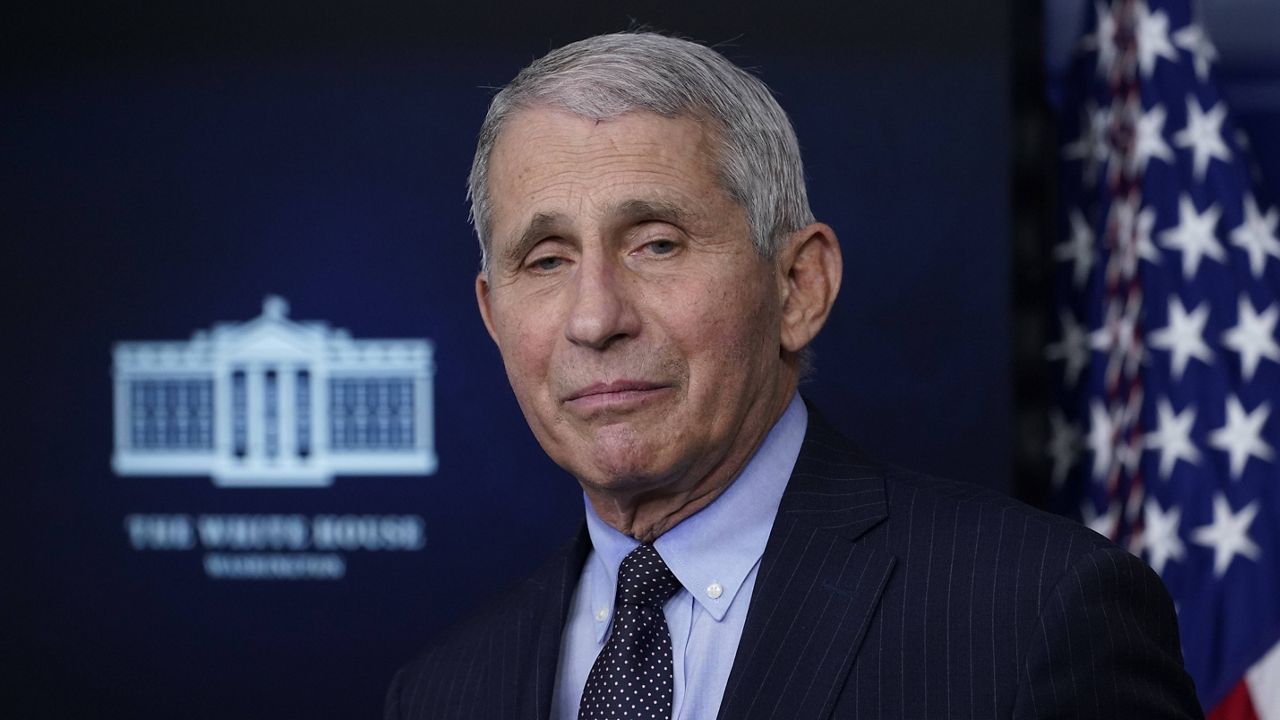At a White House COVID-19 briefing on Thursday, Dr. Anthony Fauci says it is "very likely" Americans will need to get a third dose of a coronavirus vaccine to be considered fully vaccinated against COVID-19.
In response to a question from a reporter about Israel requiring a third dose to be fully vaccinated, the nation's top infectious disease expert said that the the Food and Drug Administration (FDA) and the Centers for Disease Control and Prevention (CDC) would ultimately make the final determination about a change to vaccination status.
"But I must say, from my own experience as an immunologist, I would not at all be surprised that the adequate full regimen for vaccination will likely be three doses," Dr. Fauci said, adding that a third dose will be required to provide long-term protection against the coronavirus.
A recently released study from the Israeli health ministry suggests that 12 days after receiving a third dose of the Pfizer-BioNTech vaccine, the risk of severe illness and confirmed infection drops tenfold.
"The reason I say that is that it's very clear when you give a prime and maybe a second shot as a boost, but give the immune system enough chance to mature ... it is entirely understandable why the results that we just reported from the Israeli boosters are so dramatic," Dr. Fauci said.
"And we all hope, and I believe we have good reason to believe, that that only will not be a strong response, but that it will actually be durable," he added. "And if it is durable, then you're gonna have very likely a three-dose regimen being the routine regimen."
Separately, White House COVID-19 coordinator Jeff Zients said that the federal government will bring the “same intensity” to encouraging Americans to get booster shots as it did for the initial vaccination campaign.
The FDA scheduled a meeting for its committee of outside vaccine advisers to discuss approving Pfizer-BioNTech COVID-19’s booster shots. The meeting is scheduled for Sept. 17, three days before President Joe Biden said the U.S. would start offering the shots to people eight months after their initial vaccination was completed, pending approval from the FDA and the Centers for Disease Control and Prevention.
“The administration recently announced a plan to prepare for additional COVID-19 vaccine doses, or ‘boosters,’ this fall, and a key part of that plan is FDA completing an independent evaluation and determination of the safety and effectiveness of these additional vaccine doses,” Dr. Peter Marks, director of the FDA’s Center for Biologics Research and Evaluation, said in a statement.
The FDA granted full approval to the Pfizer-BioNTech vaccine last month, but booster shots require separate authorization. Boosters, however, are currently available in the U.S. to immunocompromised people.
Marks said the FDA is evaluating data from Pfizer and BioNTech, which the advisory panel will discuss at the committee. The committee’s recommendation is not binding but will inform the FDA’s decision-making.
“A transparent, thorough and objective review of the data by the FDA is critical so that the medical community and the public continue to have confidence in the safety and effectiveness of COVID-19 vaccines,” Marks said. “The FDA will review the supplemental application as expeditiously as possible, while still doing so in a thorough and science-based manner.”
Biden’s announcement last month about his booster shot plan was met with criticism for different reasons. Some scientists have argued the move was premature because data showing booster shots are needed are not compelling enough. The World Health Organization’s director-general, Tedros Adhanom Ghebreyesus, called for a moratorium on administering booster shots, saying they would contribute to vaccine inequality among rich and poorer nations.
Those topics are likely to come up during the advisory panel's meeting.
Meanwhile, some health experts have accused Biden of exerting pressure on regulators by announcing his booster plan before they were able to formally review the data.
This week, two top FDA officials — Director of the Office of Vaccines Research and Review Dr. Marion Gruber and her deputy, Dr. Philip Krause — announced they will be retiring in this fall. According to reports, Gruber and Krause have grown frustrated with the White House and other agencies interfering with the FDA’s work, although it’s not clear whether that is the reason they are retiring.
When asked about their departures Tuesday, Jeff Zients, the White House’s COVID-19 response coordinator, said the Biden administration has been clear all along that its booster shot plan hinges on the FDA and CDC and that the FDA’s acting commissioner, Dr. Janet Woodcock, was among the public health officials who signed off on the announcement.
Biden also said last month that Moderna’s boosters could be administered Sept. 20 as well, but the company only submitted its application to the FDA on Wednesday.
Spectrum News' Ryan Chatelain and The Associated Press contributed to this report.





